英语短语分类详细讲解
- 格式:docx
- 大小:31.22 KB
- 文档页数:15

英语6种短语类型整理English:Noun Phrases.Noun phrases are the most basic type of phrase and they consist of a noun, which can be a single word or a group of words that function as a noun. For example:The boy.The woman with the red hat.The car that parked in the driveway.Verb Phrases.Verb phrases consist of a verb, which can be either an action verb or a linking verb, and any modifiers that may be present. For example:Is running.Has been running.Will be running.Adjective Phrases.Adjective phrases consist of an adjective and any modifiers that may be present. For example:Very tall.Extremely happy.Quite intelligent.Adverb Phrases.Adverb phrases consist of an adverb and any modifiers that may be present. For example:Very quickly.Extremely loudly.Quite slowly.Prepositional Phrases.Prepositional phrases consist of a preposition, which shows the relationship between a noun or pronoun and another word in the sentence, and a noun or pronoun that is the object of the preposition. For example:In the house.Under the table.On the chair.Appositive Phrases.Appositive phrases consist of a noun or pronoun that renames or provides additional information about another noun or pronoun. For example:John, the mayor, was giving a speech.The students, who were studying hard, passed the test.中文回答:名词短语。

.动词短语和常用习惯表达动词短语是许多省高考的必考内容。
有时一个动词可以跟多个小品词构成多个短语动词,有时一个短语动词又有多个意思。
在平时的学习中,我们要有意识地去积累这方面的知识,这样才能使学习更高效。
掌握好常用的动词短语和习惯表达对于我们做完形和阅读的帮助也很大。
第1讲常用动词短语(一)考点1.break相关短语break down (机器)停止运转;(健康、精神)崩溃;(系统、讨论等)出问题;分解break away 打破陈规,放弃习惯;奋力挣脱break out (战争、疫情、火灾等)爆发break in/into 破门而入break up 打碎、分裂;分手Let’s break up the whole into parts. You must break away from these old customs.The dog broke away from its owner and ran away.After a long time of hard work,he almost broke down. Why did the peace talks break down?This matter will break down in water.1.He had to pause from time to time to wipe the sweat from his forehead, because the air-conditioning system _____.A. broke inB. broke upC. broke outD. broke down2.Old-fashioned phones matter when wireless networks ______ in disasters.A. turn downB. turn outC. break downD. break out3.—I’ m surprised to hear that Sue and Paul have ______.—So am I. They seemed very happy together when I last saw them.A. broken upB. finished upC. divided upD. closed up4.The computer system ______ suddenly while he was searching for information on the Internet.A. broke downB. broke outC. broke upD. broke in5.I was still sleeping when the fire ______, and then it spread quickly.A. broke outB. put outC. came outD. got out考点2.call相关短语Call your dog off. The match was called off because of bad weather. This problem calls for careful thought. They boy called out for help.I’ll call for you at seven this evening. We call for the package at the post office.The toy company has decided to call in the defective products all over the world.6.The Somali robbed frequent attacks on the sea urged the United Nations to__all nations to take i mmediate action.A. fight forB. apply forC. call onD. wait on7.It’s the sort of work that ______ a high level of concentration.A. calls forB. makes upC. lies inD. stands for8.As I grew up in a small town at the foot of a mountain, the visit to the village ______scenes of my childhood.A. called upB. called forC. called onD. called in考点e相关短语Things are coming along fine. When does their new album come out? The subject came up at the meeting yesterday. 这个话题昨天在会议上被提及。
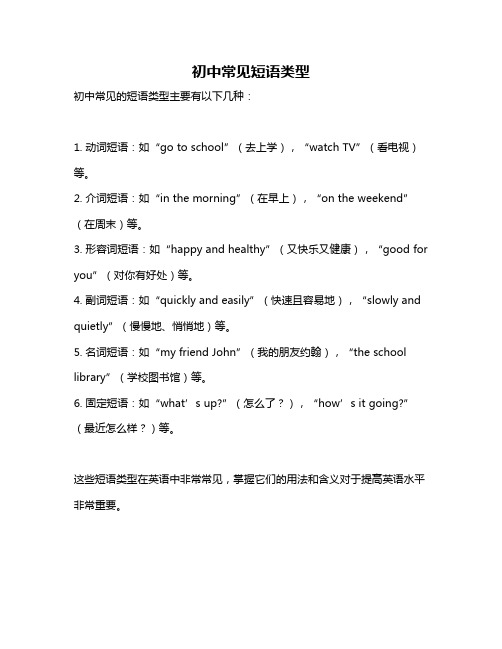
初中常见短语类型
初中常见的短语类型主要有以下几种:
1. 动词短语:如“go to school”(去上学),“watch TV”(看电视)等。
2. 介词短语:如“in the morning”(在早上),“on the weekend”(在周末)等。
3. 形容词短语:如“happy and healthy”(又快乐又健康),“good for you”(对你有好处)等。
4. 副词短语:如“quickly and easily”(快速且容易地),“slowly and quietly”(慢慢地、悄悄地)等。
5. 名词短语:如“my friend John”(我的朋友约翰),“the school library”(学校图书馆)等。
6. 固定短语:如“what’s up?”(怎么了?),“how’s it going?”(最近怎么样?)等。
这些短语类型在英语中非常常见,掌握它们的用法和含义对于提高英语水平非常重要。
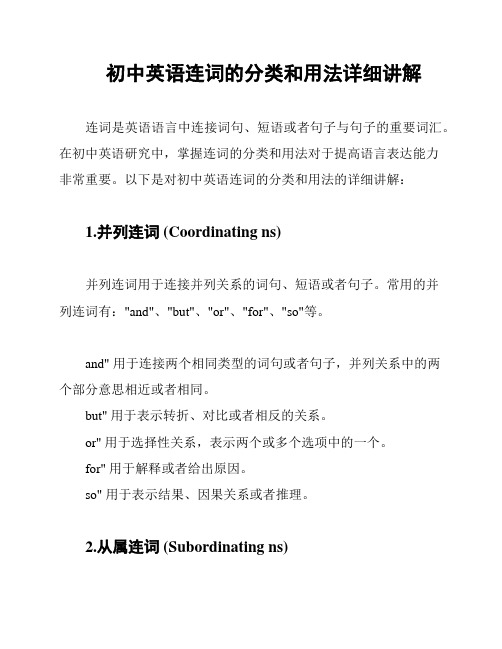
初中英语连词的分类和用法详细讲解连词是英语语言中连接词句、短语或者句子与句子的重要词汇。
在初中英语研究中,掌握连词的分类和用法对于提高语言表达能力非常重要。
以下是对初中英语连词的分类和用法的详细讲解:1.并列连词 (Coordinating ns)并列连词用于连接并列关系的词句、短语或者句子。
常用的并列连词有:"and"、"but"、"or"、"for"、"so"等。
and" 用于连接两个相同类型的词句或者句子,并列关系中的两个部分意思相近或者相同。
but" 用于表示转折、对比或者相反的关系。
or" 用于选择性关系,表示两个或多个选项中的一个。
for" 用于解释或者给出原因。
so" 用于表示结果、因果关系或者推理。
2.从属连词 (Subordinating ns)从属连词用于连接主从关系的词句、短语或者句子。
常用的从属连词有:"because"、"although"、"unless"、"while"等。
because" 用于表示原因。
although" 用于表示让步关系。
unless" 用于表示条件关系,相当于"if。
not"。
while" 用于表示时间关系。
3.连接副词 (Conjunctive Adverbs)连接副词用于连接词句、短语或者句子,承上启下,起到过渡和衔接的作用。
常用的连接副词有:"however"、"therefore"、"meanwhile"、"furthermore"等。
however" 用于表示转折、对比或者相反的关系。

40 个高考英语必备动词及词组讲解建议和考试说明词汇一起印发给学生1. agree vi. 同意;持相同意见I cannot agree with you on this point. 在这一点上,我不能同意你的意见。
sb agree with sb 同意某人的话,意见sth agree with sb 某物,某事适应某人sth agree with sth 与---一致The climate here doesn't agree with me. 我不适应这里的气候。
agree to sb 建议agree on sth 在某一点上取得一致意见agree to do sth 同意干某事2. break vt. 打破;损坏;破坏;n. 休息He has broken the world record again.We should all take a little break before dessert. 吃甜点之前我们大家应该稍微休息一下。
break down 机器坏了=go wrong身体垮了/ 终止谈话I had never seen a grown man break down and cry.我从未曾看到过一个这么强壮的汉子痛哭。
break in 闯入,插话break off 忽然停止讲话/ 断绝,结束/ 暂停工作,休息break out (战争等)爆发;逃出(无被动式)The war broke out in 1937.这场战争1937 年爆发的。
break through 打破包围break up 驱散,学校的放学The police had to employ force to break up the crowd. 警察不得不使用武力驱散人群。
break into pieces 打烂成碎片break away from 脱离,逃说,与…断绝来往/改变某种习惯3. bring vt. 拿来;带来;取来I'll bring some of my pictures into the gallery. 我就带一些我的摄影到艺廊来。

初中英语短语动词语法介绍初中英语短语动词语法大全短语动词基本的构造是哪些呢?下面是老师为同学们带来的关于短语动词用法的具体介绍。
供同学们参考。
希望对同学们有帮助!动词加小品构成的起动词作用的短语叫短语动词(Phrasal Verb)。
例如:Turn off the radio. 把收音机关上。
(turn off是短语动词)短语动词的构成基本有下列几种:1)动词+副词,如:black out;2)动词+介词,如:look into;3)动词+副词+介词,如:look forward to。
构成短语动词的副词和介词都统称为小品词(Particle)。
对于老师为大家带来的对短语动词用法的介绍,同学们有不懂得可以参考英语用法大全更多相关的英语知识等着同学们的参加哦!初中英语语法大全:动词的种类关于英语中动词的种类知识,希望同学们很好的掌握下面的内容学习。
动词的种类动词是表示动作或状态的词,按其词义和在句子中的作用可分为行为动词,连系动词,助动词和情态动词。
1.行为动词行为动词可分为及物动词(vt)和不及物动词(vi),及物动词表示动作或状态,有完整的词义,能单独作谓语,后跟宾语;不及物动词表示动作或状态,有完整的词义,能单独作谓语,但后面不能直接跟宾语,如要带宾语则与介词或副词构成短语。
如:More and more people study English.(vt)The students are listening to the teacher carefully.(vi)2.连系动词连系动词本身有一定的词义,但不能独立作谓语,必须与表语一起构成谓语。
常用的连系动词有be, get, turn, become, look, feel, grow, seem, sound, taste, smell等。
如:Our country is becoming stronger and stronger.It feels damp.3.助动词助动词本身无词义,不能单独作谓语,只能和主要动词一起构成谓语动词,表示否定,疑问及动词的时态、语态、人称和数等语法特征,助动词有be,do,have,shall,will等。
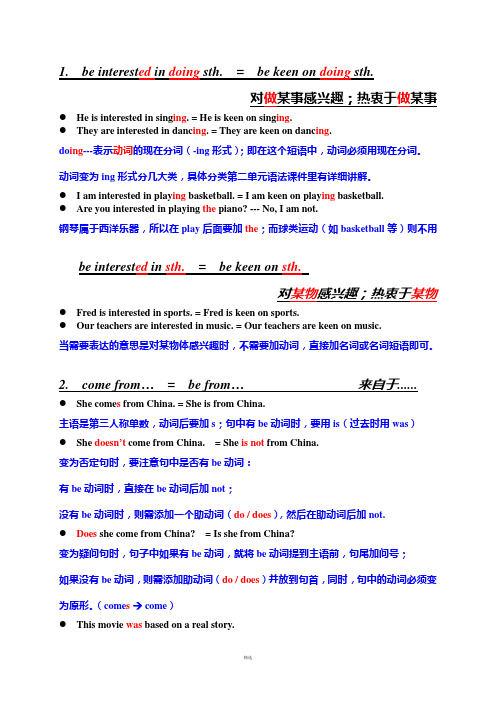
1. be interest ed in doing sth. = be keen on doing sth.对做某事感兴趣;热衷于做某事●He is interested in sing ing. = He is keen on sing ing.●They are interested in danc ing. = They are keen on danc ing.do ing---表示动词的现在分词(-ing形式);即在这个短语中,动词必须用现在分词。
动词变为ing形式分几大类,具体分类第二单元语法课件里有详细讲解。
●I am interested in play ing basketball. = I am keen on play ing basketball.●Are you interested in playing the piano? --- No, I am not.钢琴属于西洋乐器,所以在play后面要加the;而球类运动(如basketball等)则不用be interest ed in sth.= be keen on sth.对某物感兴趣;热衷于某物●Fred is interested in sports. = Fred is keen on sports.●Our teachers are interested in music. = Our teachers are keen on music.当需要表达的意思是对某物体感兴趣时,不需要加动词,直接加名词或名词短语即可。
2. come from…= be from…来自于......●She come s from China. = She is from China.主语是第三人称单数,动词后要加s;句中有be动词时,要用is(过去时用was)●She doesn’t come from China. = She is not from China.变为否定句时,要注意句中是否有be动词:有be动词时,直接在be动词后加not;没有be动词时,则需添加一个助动词(do / does),然后在助动词后加not.●Does she come from China? = Is she from China?变为疑问句时,句子中如果有be动词,就将be动词提到主语前,句尾加问号;如果没有be动词,则需添加助动词(do / does)并放到句首,同时,句中的动词必须变为原形。

短语是英语构成的具有实际意义的一个重要的基本单位,掌握好英语短语的基本分类对英语阅读和写作具有十分重要的意义。
通俗的讲,英语短语可以分为以下几类:一、名词短语1.简单名词短语(定语位于中心名词之前)(1)形容词作定语【多个形容词做定语顺序:限观大龄(新旧)形色国材+中心名词】a useful book 一本有用的书 an old round stone table 一张旧的圆石桌(2 ) 名词作定语a shoe factory 一家鞋厂 women nurses 女护士 clothes shop 成衣店(3 ) V-ing作定语(表主动、进行)swimming pool 游泳池 boiling water 沸水 developing country 发展中国家(4) 过去分词作定语(表被动、完成、感受)a broken bike 一辆坏了的自行车 lost books 丢失的书developed countries 发达国家 boiled water 开过的水a satisfied expression_r 满意的表情 polluted river 污染的河流(5)代词作定语try one’s best尽最大努力 our school 我们的学校2.复杂名词短语(复杂定语位于中心名词之后,翻译时加“的”)(1)介词短语作定语the picture on the wall 墙上的图画 people in London 伦敦人(2 ) 现在分词短语作定语(表主动、进行)the man standing over there站在那边的那个人 the girl crying outside 在外边哭泣的女孩(3 ) 过去分词短语作定语(表被动)the lessons given by Mr. Li 李老师的课 the novel written by Lu Xun 鲁迅写的小说(4 ) 动词不定式作定语(表将来)the meeting to be held tomorrow 明天要举行的会议the first student to get to school 第一个到校的学生a big house to live in 要住的大房子 something to eat 可吃的东西(5 ) 定语从句作定语the man whom you’re looking for 你要找的人the book which you lost 你丢的书the best film I’ve seen我看过的最好的电影the people and things I saw 我所看到的人和事the days we spent there 我们在那儿度过的日子the factory we visited 我们参观的那个工厂the day when I left 我离开的那天the factory where Tom works Tom所在的工厂the reason why he came late 他迟到的原因the boy whose father is a policeman 父亲当警察的那个男孩二、介词短语(介词+宾语)(详情请见词类讲解部分)常用介词in five days 再过五天 in 2008 在2008年 in the box 在盒子里in Chinese 用汉语 in time 及时 in need of 需要on the desk 在桌子上 on Monday, June 1st在7月1日 on time 按时on the corner of 在拐角处 on purpose 故意on one’s own 独立地at 5 pm 在下午五点 at the hotel 在宾馆 at once 立刻,马上at the end/foot/top of 在…末/山脚下/顶上 at the table 在桌子旁with a pen 用钢笔with one’s help 在某人帮助下 without water 没有水to one’s surprise 使某人惊讶的是 thanks to 多亏,幸亏from morning till night 从早到晚 for a long time 持续很长时间三、形容词、副词短语too (short, young, tired……)to……太(矮,小,累)而不能……( old, tall, strong…… ) enough to…… 已足够(大,高,强壮)而能够……as soon as possible 尽快地 as carefully as I can 尽可能小心/认真地as big as 和……一样大 not as/so old as 不如……大much better than 比……好得多 even more beautiful than 比……更漂亮shorter and shorter 越来越短 the more, the better 越多越好more and more careful 越来越小心 the best book of all 最好的书四、动词短语(1)含be/连系动词(be/feel、look……+形容词/v-ed+介词)be open to 对……开放 be interested in 对……感兴趣be glad to meet you 见到你很高兴 be/get used to smoking 习惯于吸烟(2)动词+v-ing/to v/普通名词enjoy doing sth 喜欢干某事 finish doing sth 干完某事want to leave 想要离开 plan to do sth 计划看某事drink wine 喝酒 walk the dog 遛狗(3)动词+介词look at 看着 listen to 听 stick to 坚持(4)动词+副词put up 举起,张贴 put on 穿上 put down 放下 put away放好,收拾好give up 放弃,戒掉 give away 捐出,放出 give back 归还(5)动词+副词+介词look forward to 盼望,期望 look down upon 轻视,看不起(6)动词+宾语+介词spend …… on把时间/金钱花在……上pay ……for花钱买……pay attention to 重视,注意 make contributionsto 为……做贡献devote oneself to 投身于……(7)动词+宾语+补语make the school beautiful 使学校美丽 find a seat to sit on 找个座位坐find it important to learn English well 发现学好英语很重要5.其他短语want to spend as much time I can learning English 想要花尽可能多的时间学英语experiment new ways of treating growing piles of rubbish 实验处理成堆垃圾的新方式。

短语是英语构成的具有实际意义的一个重要的基本单位,比如动词短语(have been doing)、介词短语(for you)、名词短语(my best friend)等等,掌握好英语短语的基本分类对英语阅读和写作具有十分重要的意义。
一、名词短语(noun phrase )1、名词短语的功能名词短语的简单定义:名词与它的修饰语一起即构成名词短语。
先来看几个简单的例子:①These red roses are for you .在句中充当主语。
②I have three close friend .译:我有三个要好的朋友。
在句中充当宾语。
②He is my best friend .译:他是我最好的朋友。
在句中充当表语。
③There are some red roses on that small table .some red roses在句中充当主语; that small table在句中充当介词on的宾语。
以上例句中的名词短语,都包含在英语句子和文章中。
可以充当句子中的各个成分。
※注意:英文中的介词不能单独使用,其后面必须接宾语,所接的宾语往往是名词短语(如例句4)。
the bird in the tree 树上的那只小鸟the map on the wall 墙上的地图the development of China 中国的发展the standard of living 生活水平the south side of the Changjiang river 长江南岸the way to the hotel 去旅馆的路the life in the future 未来的生活名词短语有如此重要的作用,那么这么重要的句子构成要素是怎样构成的呢?下面来详细总结它的构造规律。
2、名词短语的构造名词短语由名词与它的修饰语一起构成。
名词的修饰语与名词有两种位置关系:一是放在被修饰名词的前面,叫做前置定语或定语;二是放在被修饰名词的后面,叫做后置定语。
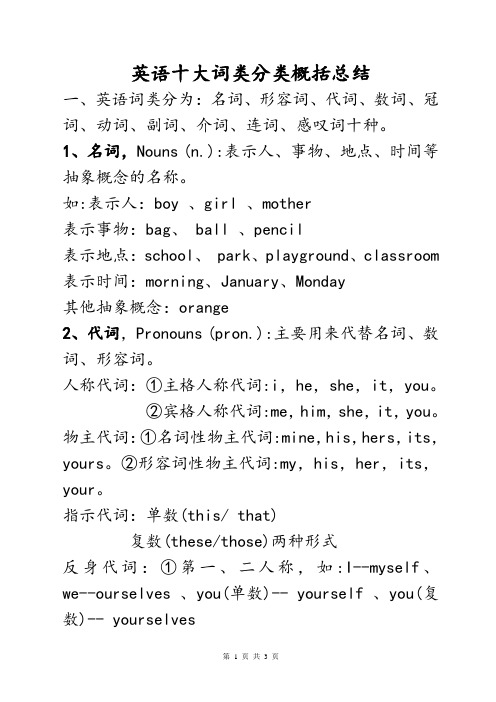
英语十大词类分类概括总结一、英语词类分为:名词、形容词、代词、数词、冠词、动词、副词、介词、连词、感叹词十种。
1、名词,Nouns (n.):表示人、事物、地点、时间等抽象概念的名称。
如:表示人:boy 、girl 、mother表示事物:bag、 ball 、pencil表示地点:school、 park、playground、classroom 表示时间:morning、January、Monday其他抽象概念:orange2、代词,Pronouns (pron.):主要用来代替名词、数词、形容词。
人称代词:①主格人称代词:i,he,she,it,you。
②宾格人称代词:me,him,she,it,you。
物主代词:①名词性物主代词:mine,his,hers,its,yours。
②形容词性物主代词:my,his,her,its,your。
指示代词:单数(this/ that)复数(these/those)两种形式反身代词:①第一、二人称,如:I--myself、we--ourselves 、you(单数)-- yourself 、you(复数)-- yourselves②第三人称,如:she--herself、he --himself 、it--itself 、they--themselves 、one-- oneself 3、形容词, Adjectives(adj.): 用来修饰名词,表示人或事物的性质或特征。
如:good、 right、 great、 beautiful .4、数词,Numerals(num.):表示数目或事物的顺序。
如:one、two、three、first(第一)、second(第二)、third(第三)、fourth (第四).5、动词,Verb (v.):表示动作或状态。
如:am 、is、 are、 have(有)、see(见)6、副词,Adverbs(adv.):修饰动词、形容词或副词,表示动作特征 ,说明时间、地点、程度等。
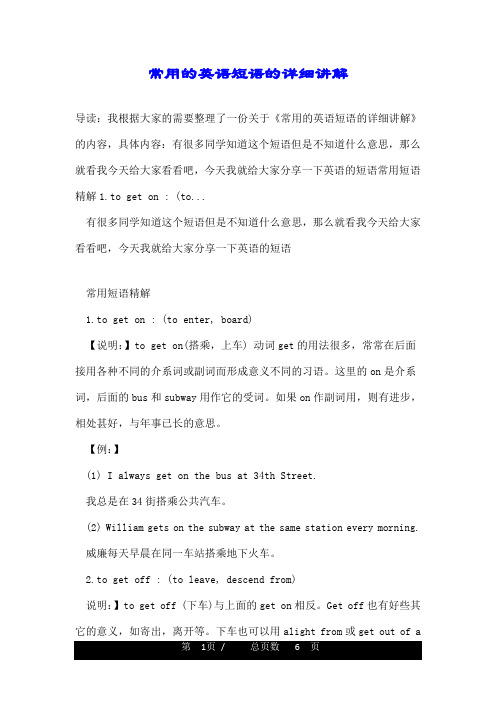
常用的英语短语的详细讲解导读:我根据大家的需要整理了一份关于《常用的英语短语的详细讲解》的内容,具体内容:有很多同学知道这个短语但是不知道什么意思,那么就看我今天给大家看看吧,今天我就给大家分享一下英语的短语常用短语精解1.to get on : (to...有很多同学知道这个短语但是不知道什么意思,那么就看我今天给大家看看吧,今天我就给大家分享一下英语的短语常用短语精解1.to get on : (to enter, board)【说明:】to get on(搭乘,上车) 动词get的用法很多,常常在后面接用各种不同的介系词或副词而形成意义不同的习语。
这里的on是介系词,后面的bus和subway用作它的受词。
如果on作副词用,则有进步,相处甚好,与年事已长的意思。
【例:】(1) I always get on the bus at 34th Street.我总是在34街搭乘公共汽车。
(2) William gets on the subway at the same station every morning.威廉每天早晨在同一车站搭乘地下火车。
2.to get off : (to leave, descend from)说明:】to get off (下车)与上面的get on相反。
Get off也有好些其它的意义,如寄出,离开等。
下车也可以用alight from或get out of acarriage或motor car, 不过下电车或公共汽车多用get off .【例:】(1) Helen got off the bus at 42nd Street.海伦在42街下公共汽车。
(2) At what station do you usually get off the subway?你通常在那一站下地下火车?3.to put on: (to place on oneself-said particularly of clothes)【说明:】to put on (穿,戴)特别指穿衣服、穿鞋、戴帽、戴眼镜也用这个成语。
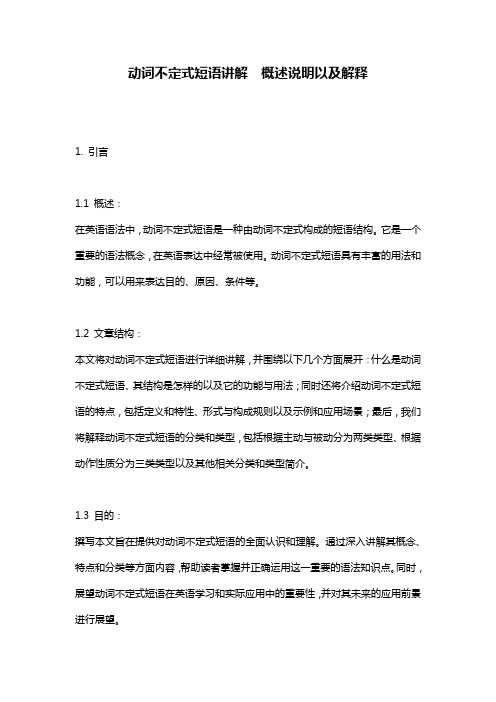
动词不定式短语讲解概述说明以及解释1. 引言1.1 概述:在英语语法中,动词不定式短语是一种由动词不定式构成的短语结构。
它是一个重要的语法概念,在英语表达中经常被使用。
动词不定式短语具有丰富的用法和功能,可以用来表达目的、原因、条件等。
1.2 文章结构:本文将对动词不定式短语进行详细讲解,并围绕以下几个方面展开:什么是动词不定式短语、其结构是怎样的以及它的功能与用法;同时还将介绍动词不定式短语的特点,包括定义和特性、形式与构成规则以及示例和应用场景;最后,我们将解释动词不定式短语的分类和类型,包括根据主动与被动分为两类类型、根据动作性质分为三类类型以及其他相关分类和类型简介。
1.3 目的:撰写本文旨在提供对动词不定式短语的全面认识和理解。
通过深入讲解其概念、特点和分类等方面内容,帮助读者掌握并正确运用这一重要的语法知识点。
同时,展望动词不定式短语在英语学习和实际应用中的重要性,并对其未来的应用前景进行展望。
请问还有什么需要补充的吗?2. 动词不定式短语讲解:2.1 什么是动词不定式短语动词不定式短语是由动词不定式和其相关的修饰成分所构成的一个独立的结构。
它通常在句子中作为名词、形容词或副词的补足语,用来表达一些特定的意义或功能。
2.2 动词不定式短语的结构一个典型的动词不定式短语由一个基本形式的动词不定式(包括“to”+动词原形)作为核心,以及可能出现的修饰成分组成。
修饰成分可以是副词、介词短语、形容词、名词等。
2.3 动词不定式短语的功能与用法动词不定式短语可以用来表达多种功能和意义。
以下是几个常见用法:1) 作主语:例如,“To study is important for students.”(学习对于学生很重要)2) 作宾语:例如,“I want to go to the park.”(我想去公园)3) 作表语:例如,“Her dream is to become a doctor.”(她的梦想是当医生)4) 作宾补:例如,“They made him sign the contract.”(他们让他签署了合同)5) 作定语:例如,“I need a book to read.”(我需要一本书来阅读)6) 作状语:例如,“He went to the library to study.”(他去图书馆学习)动词不定式短语还可以用于被动结构、条件句、目的状语从句以及其他复杂句型中。

英语语法的详细讲解分析英语语法的详细讲解分析“语法”这个词的含义其实就是字面意思,“语”是“语言”,“法”是“用法、准则、模式、合理性”,其涵盖的基本内容主要包括以下几大类(这个知识框架有点长,不感兴趣的可以略过):1.Phrases,clauses,sentences短语,分句,句子(1)Phrases短语——短语里不含主语或谓语。
短语类型包括:prepositionalphrases介词短语:由介词加介词后面所带的名词或代词构成的短语participialphrases分词短语:由动词分词(可以是现在分词或过去分词)引出的短语gerundphrases动名词短语:由动名词引出的'短语infinitivephrases动词不定式短语:由动词不定式引出的短语verbphrases动词短语:多于一个单词的动词(2)Clauses分句——分为独立分句和非独立分句。
Independentclauses独立分句:有完整的“主语+谓语”结构,是可以独立成句的。
Dependentclauses非独立分句:subordinateclauses附属从句:结构为“附属连词+主语+谓语”relativeclauses关系从句:结构为“关系代词+主语+谓语”restrictiverelativeclauses限制性关系从句nonrestrictiverelativeclauses非限制性关系从句(3)Sentences句子按句子形式(form)划分:simplesentences简单句:结构为“1个独立分句”complexsentences复杂句:结构为“1个独立分句+1个非独立分句”,由从属连词连接compoundsentences复合句:结构为“1个独立分句+1个独立分句”,由并列连词连接complex-compoundsentences复合复杂句:包含至少一个复杂句结构和至少一个复合句结构按句子功能(function)划分:declaratorysentences陈述句imperativesentences祈使句exclamatorysentences感叹句interrogativesentences疑问句2.Partsofspeech词性(1)Nouns名词person人称First第一人称Second第二人称Third第三人称gender阴阳number单复数Singular单数Plural复数case格subjectivecase主格objectivecase宾格possessivecase所有格(2)Pronouns代词(3)Verbs动词(4)Adjectives形容词(5)Adverbs副词(6)Conjunctions连词(7)Preposition介词(8)Interjections感叹词(9)article冠词(10)expletive……这个我给跪了不知如何翻译成中文。
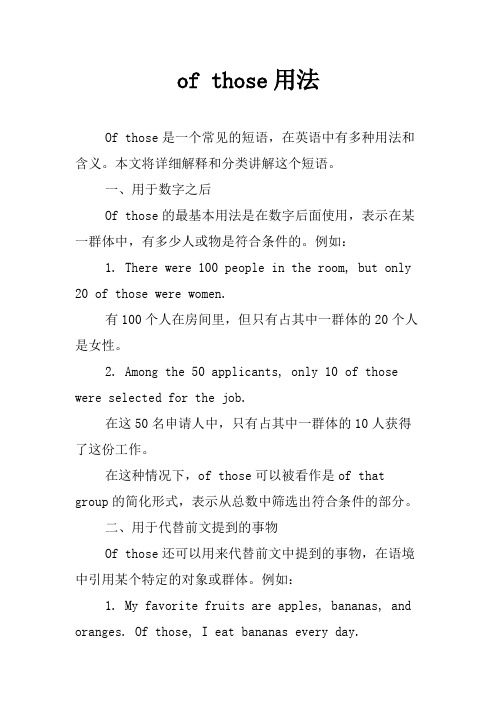
of those用法Of those是一个常见的短语,在英语中有多种用法和含义。
本文将详细解释和分类讲解这个短语。
一、用于数字之后Of those的最基本用法是在数字后面使用,表示在某一群体中,有多少人或物是符合条件的。
例如:1. There were 100 people in the room, but only 20 of those were women.有100个人在房间里,但只有占其中一群体的20个人是女性。
2. Among the 50 applicants, only 10 of those were selected for the job.在这50名申请人中,只有占其中一群体的10人获得了这份工作。
在这种情况下,of those可以被看作是of that group的简化形式,表示从总数中筛选出符合条件的部分。
二、用于代替前文提到的事物Of those还可以用来代替前文中提到的事物,在语境中引用某个特定的对象或群体。
例如:1. My favorite fruits are apples, bananas, and oranges. Of those, I eat bananas every day.我最喜欢的水果是苹果、香蕉和橙子。
在这其中,我每天吃香蕉。
2. The company produces many different products, but of those, their best-seller is the new smartphone.这家公司生产很多种产品,但在其中,他们的畅销产品是新款智能手机。
在这种使用中,of those实际上相当于that subset,引用前文已经提到的特定对象或群体。
三、用于比较当进行比较时,of those也是一个常见的用法,通常表示两个或多个事物中的之一。
例如:1. There were two cakes at the party, but of those, the chocolate cake was more popular than the vanilla one.派对上有两个蛋糕,但在其中,巧克力蛋糕比香草蛋糕更受欢迎。